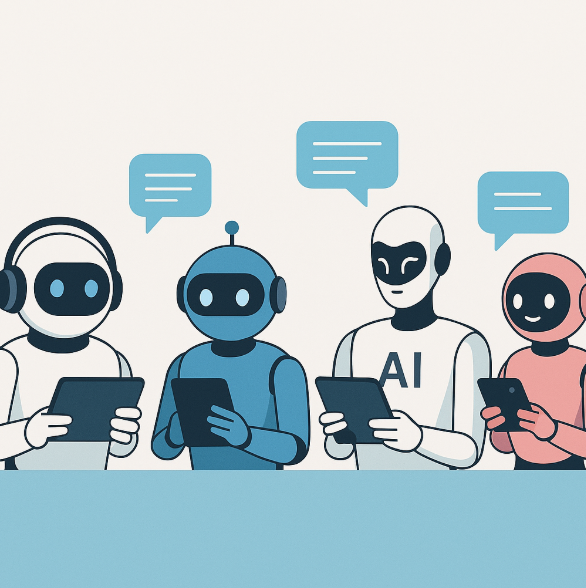From scheduling meetings to writing emails, managing to-do lists to booking flights, AI-powered personal assistants are transforming how we live and work in 2025. These digital companions are no longer basic voice assistants they’ve evolved into context-aware, proactive productivity partners powered by the latest advancements in generative AI and machine learning.
With so many AI assistants now available from ChatGPT and Copilot to Pi and Claude users are wondering: Which AI-powered personal assistant is the best? The answer depends on your needs: Do you want an empathetic conversation partner, a task-oriented planner, a business assistant, or a creative collaborator?
In this blog, we’ll explore the top AI personal assistants in 2025, compare their strengths, and help you decide which one fits your lifestyle or workflow best.
What Are AI Personal Assistants in 2025?
Unlike the limited bots of the past (think Siri or Alexa circa 2017), today’s AI assistants are powered by large language models (LLMs), giving them:
- Natural, human-like conversations
- The ability to understand context over time
- Access to tools like calendars, emails, and browsers
- Emotional intelligence and memory features
- Integration with your favorite apps and devices
These assistants can now summarize documents, draft emails, schedule appointments, coach your communication style, help you brainstorm, and even track your mood.
Top AI-Powered Personal Assistants to Know in 2025
Let’s compare the top contenders that are shaping the AI assistant space this year:
- ChatGPT (with GPT-4o) – by OpenAI
Best For: All-purpose use, productivity, creativity, research
Interface: Web, mobile app, desktop app, integrated in Microsoft apps
Key Features:
- Uses GPT-4o, OpenAI’s most advanced model
- Vision input (can analyze images and screenshots)
- Voice conversation (natural, fast, expressive)
- Access to files, web browsing, and custom tools
- Can remember preferences and context over time
Why It’s Great:
ChatGPT is a versatile and highly intelligent assistant that handles nearly everything from planning trips and analyzing spreadsheets to coding, tutoring, and life coaching. Its integration with tools like DALL·E, Python, browser, and memory makes it a personal assistant powerhouse.
Best For: Professionals, creators, students, general users
- Microsoft Copilot
Best For: Business productivity, Office 365 users
Interface: Built into Word, Excel, Outlook, Teams, Windows 11
Key Features:
- Native integration with Microsoft apps
- Writes and edits documents, emails, and presentations
- Summarizes meetings and email threads
- Handles Excel formulas and data visualizations
- Enterprise-grade security and compliance
Why It’s Great:
Copilot is ideal for enterprise environments, helping users automate repetitive work across Microsoft tools. Its tight integration within Office products makes it feel like a natural extension of your workflow.
Best For: Executives, analysts, corporate teams
- Pi – by Inflection AI
Best For: Emotionally intelligent conversations and life reflection
Interface: Web, app, voice
Key Features:
- Designed for empathetic, thoughtful dialogue
- Offers emotional support and self-reflection tools
- Great at building long-term memory and context
- Doesn’t focus on hard productivity more about clarity and presence
Why It’s Great:
Pi is built to be a digital confidant. While it doesn’t generate spreadsheets or write blog posts, it excels at coaching, companionship, and mindful discussions, helping users process thoughts, set goals, or reflect on feelings.
Best For: Personal growth, journaling, mindfulness seekers
- Claude – by Anthropic
Best For: Deep reasoning, thoughtful communication
Interface: Web, API, Slack
Key Features:
- Uses Constitutional AI for safety and reliability
- Strong contextual understanding over long documents
- Summarizes PDFs and legal/technical documents with precision
- More balanced and careful responses than GPT models
Why It’s Great:
Claude is a reliable assistant that excels in long-form tasks, reading comprehension, and ethical safety. It’s the best choice for users who work with large files or value careful reasoning.
Best For: Lawyers, researchers, teams needing safe AI
- Replika AI
Best For: Personal conversation, mental health support
Interface: Mobile, web, VR
Key Features:
- Offers a customizable AI companion personality
- Supports mental health journaling, coaching, and gamified interaction
- More focused on relationships than productivity
Why It’s Unique:
Replika is more of a friendship-oriented chatbot than a professional tool. It builds an emotional bond over time and offers mood tracking, personalized dialogue, and even virtual reality experiences.
Best For: Companionship, emotional support, casual conversation
- Google Gemini
Best For: Multimodal interaction and Google ecosystem integration
Interface: Android, Gmail, Docs, Chrome, Pixel
Key Features:
- Interprets text, images, video, and audio
- Writes emails, summarizes Google Docs, handles calendar events
- Ideal for Android and Google Workspace users
- Now integrated with Android OS voice commands
Why It’s Great:
Gemini is Google’s flagship AI, replacing Bard in 2024 and now deeply integrated across their ecosystem. It’s especially strong for users who live in Google’s suite of tools.
Best For: Android users, Google app users, researchers
- Apple Intelligence (Coming Late 2025)
Best For: iOS/macOS users seeking privacy-first AI
Interface: iPhone, iPad, macOS
Key Features (preview):
- Summarizes messages, notifications, and articles
- Auto-generates replies and smart photo edits
- Built with on-device processing and privacy in mind
- Will work closely with Siri and Apple’s native apps
Why It Matters:
Apple’s late but calculated entry into AI aims to blend privacy, utility, and design. If you’re already invested in the Apple ecosystem, this assistant will feel like an invisible, intelligent layer across your apps.
Best For: Apple fans, privacy-conscious users, creatives
Quick Comparison Chart
| Assistant | Strengths | Best For |
| ChatGPT | Versatile, creative, tools-rich | General use, pros, students |
| Microsoft Copilot | Office automation, enterprise | Business, productivity |
| Pi (Inflection) | Empathetic conversations | Reflection, life coaching |
| Claude | Long-form reasoning, safe responses | Legal, research, ethical use |
| Replika | Personal bonding, mental support | Companionship, journaling |
| Gemini (Google) | Multimedia, Google Suite | Android users, researchers |
| Apple Intelligence | Private, seamless in Apple apps | iOS/macOS users |
What Makes a Good AI Personal Assistant?
When choosing an AI assistant, consider these key qualities:
- ✅ Context Retention: Does it remember previous interactions?
- ✅ App Integration: Does it connect with your calendars, notes, and files?
- ✅ Emotional Intelligence: Can it respond empathetically or provide coaching?
- ✅ Security & Privacy: Is your data encrypted or processed on-device?
- ✅ Customizability: Can you adjust tone, style, or memory?
- ✅ Real-Time Tools: Does it support web access, file uploads, or voice?
Use Cases in Everyday Life
Here’s how people are using AI assistants in 2025:
- 🧑💼 Work: Drafting presentations, writing client emails, managing calendars
- ✈️ Travel: Planning trips, checking visas, finding flights
- 🎨 Creativity: Brainstorming ideas, writing poems, editing images
- 💬 Communication: Practicing public speaking, resolving conflicts
- 🧘 Personal Growth: Journaling, setting goals, improving habits
- 🧠 Learning: Explaining complex topics, helping with language learning
The Future of AI Assistants
In the next 2–3 years, AI assistants will become proactive agents. They won’t just respond they’ll anticipate your needs, manage tasks without being asked, and collaborate in real-time with teams across apps.
Expect features like:
- Multimodal memory (text, voice, visuals)
- Cross-platform presence (from phone to car to smart home)
- Secure agent networks that handle errands and bookings
- Emotion tracking + response in real time
- Deep API integrations with apps like Notion, Slack, Zoom, and Trello
Final Verdict: Which One Should You Choose?
It depends on your needs:
- For versatility and performance: Go with ChatGPT
- For work and documents: Choose Microsoft Copilot
- For emotion and empathy: Try Pi or Replika
- For safe, balanced answers: Use Claude
- For Google users: Stick with Gemini
- For Apple fans: Wait for Apple Intelligence
No single assistant is best for everyone. The smart move? Try two or three side by side and discover which one fits into your daily life.
The future isn’t just AI it’s personalized, always-on support that works just for you. Welcome to the era of intelligent living.



